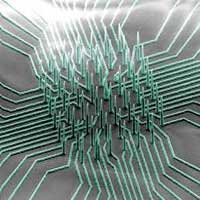
An alternative route is to develop new functional materials and their architectures. Complex oxide is one of the most promising candidates. Recently, scientists have shown novel phenomena of complex oxide at nanometer length scale and its potential for applications.
In the article “Spatial confinement tuning of quenched disorder effects and enhanced magnetoresistance in manganite nanowires” published in Science China Physics, Mechanics & Astronomy (“Spatial confinement tuning of quenched disorder effects and enhanced magnetoresistance in manganite nanowires”), scientists has fabricated a series of complex oxide known as manganites nanowires ranging from 5 µm to 50 nm, by using state-of-the-art nanolithography techniques.
From transport and magnetic imaging measurements, scientist reveals that when the nanowire size is smaller, the effect of quenched disorder becomes significantly enhanced – a new phenomenon that has not been identified before at nanometer scale.
Quenched disorder: In condensed matter physics, quenched disorder usually refers to the randomness in a material which is “frozen” or “quenched” at all times. The most common source of quenched disorder comes from impurities or chemical dopants. Quenched disorder plays significant roles in complex oxide systems.
Extensive theoretical treatments have shown the critical role of quenched disorder in complex oxide systems such as high-Tc cuprates and colossal magnetoresistive manganites. Experimental investigations, on the other hand, are rather complicated. The most common way to control quenched disorder is by chemical doping. However, chemical doping simultaneously alters material’s chemical environments, structures, etc., clouding the impact of quenched disorder.
In this article, the scientist shows that spatial confinement is a clean and effective way to study quenched disorder effect without changing the chemical environments, structure and other physical parameters.
The results reveal that enhanced quenched disorder not only can alter the nature of electronic and magnetic phase transition, but increase the magnetoreisistance up to 820000 %, a 200 times enhancement to its original values. These phenomena offer new routes on the understanding of complex materials at nanometer scales and their potential applications.
The energy and transportation sector often make use of different kinds of fluid machinery, including pumps, turbines, and aircraft engines, all of which entail a high carbon footprint. This result mainly from inefficiencies in the fluid machinery caused by flow separation around curved surfaces, which are typically quite complex in nature.
Lire la suiteResearchers described a new strategy of designing metamolecules that incorporates two independently controllable subwavelength meta-atoms. This two-parametric control of the metamolecule secures the complete control of both amplitude and the phase of light.
Lire la suite
